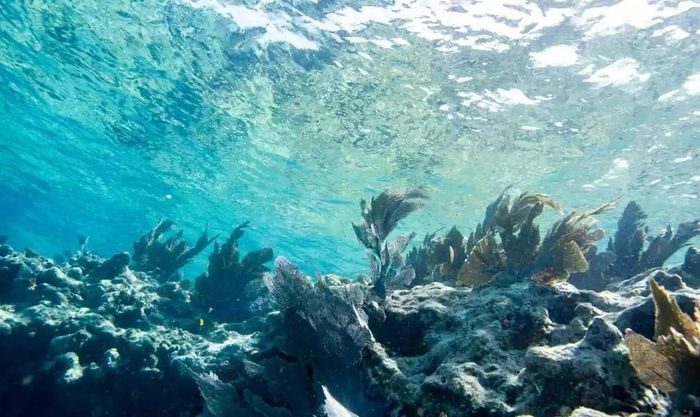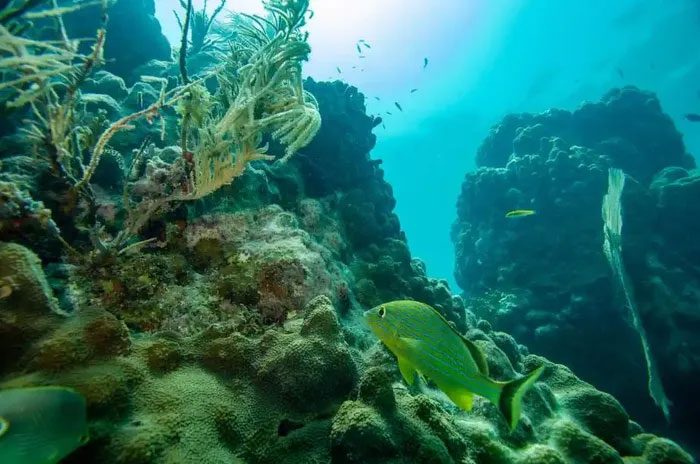The sea surface temperature around the Florida Keys (a low coral archipelago in Southeast America) surged to 38.43 degrees Celsius this week. This could mark a global record as ocean temperatures around Florida reach unprecedented extremes.
According to The Guardian on July 26, U.S. government data indicates that a water temperature buoy located in the waters of Manatee Bay within Everglades National Park recorded a temperature of 38.43 degrees Celsius late in the afternoon on July 25. Nearby buoys also reported temperatures exceeding 38 degrees Celsius.

Fish swimming around a coral reef in Key West, Florida – where shallow waters reached temperatures of 38 degrees Celsius for several hours on July 25. (Photo: AFP)
According to the National Oceanic and Atmospheric Administration (NOAA), the normal water temperature for this area at this time of year should range from 23 degrees Celsius to 31 degrees Celsius. This week’s temperature in the region is comparable to that of a hot tub.
While there are no records for ocean surface temperatures, a study from 2020 indicated that the highest temperature ever recorded was 37.6 degrees Celsius in the Persian Gulf.
The extreme temperature readings serve as another warning in a series of alerts regarding Florida’s warming waters as prolonged heat continues to scorch other parts of the U.S. The southern coast of Florida has struggled with a severe heatwave threatening marine life and ocean ecosystems.
Mr. Derek Manzello from NOAA’s Coral Reef Monitoring Program stated in an interview with CNN last week: “We did not anticipate this warming to occur so early in the year and to be so extreme. This seems unprecedented in our data.”
Heatwaves are increasingly affecting oceans worldwide, destroying kelp, seagrass, and coral, while also killing marine creatures, similar to how wildfires devastate vast forests. A 2019 study found that the number of hot days in the ocean has tripled in recent years.
Experts noted that a marine heatwave in 2021 may have killed over 1 billion marine animals along Canada’s Pacific coast.

Current heatwaves are expected to last until August. (Photo: AFP).
Experts warn that the increasing frequency and intensity of extreme weather – both on land and in the ocean – is a sign of the human-caused global climate crisis that is driving extreme phenomena. The current heatwaves are expected to persist into August.
In early July, the World Meteorological Organization (WMO) reported that global sea surface temperatures reached monthly record highs since May, partly due to the El Niño phenomenon. NOAA indicated that global sea surface temperatures broke monthly records for April, May, and June.
The temperatures in Florida also pose a threat to food supplies for humans and the livelihoods of those whose jobs are tied to the sea.
A fishing boat captain named Dustin Hansel reported declining catch yields over the last five summers. He has also observed more dead fish in the waters surrounding Key Largo. Mr. Hansel remarked: “The closer to shore, the hotter everything gets.”
NOAA has warned that warm waters around Florida could further intensify storms and tropical cyclones, generating more energy in the warmer waters. The agency noted that rising temperatures are also putting severe pressure on coral reefs.
Mr. Ian Enochs, director of the coral program at the Atlantic Oceanographic and Meteorological Laboratory of NOAA, stated that the high temperatures around the Florida Keys are endangering coral reefs. Scientists have observed bleaching and even mortality in some of the hardiest coral species in the Florida Keys.
Mr. Enochs expressed concern: “This phenomenon is happening more frequently and earlier than we have seen before. I am worried because this is occurring sooner.”
According to tropical meteorologist Brian McNoldy at the University of Miami, it is still unclear whether the temperature recorded in Florida will be considered a world record, as the area is shallow, has seagrass, and may be influenced by the warm land surrounding the nearby Everglades National Park. However, Mr. McNoldy finds this situation remarkable.


















































